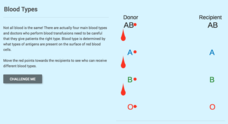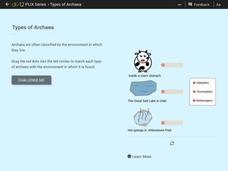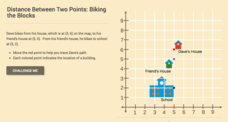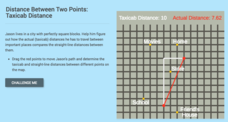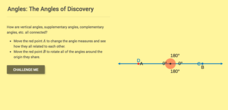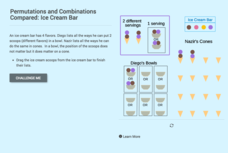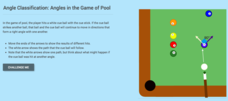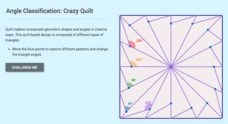CK-12 Foundation
Blood Types
Does your blood type matter? The video explains the four main blood types and the importance of knowing blood types when performing transfusions. The interactive reviews the information with a quick graphic organizer and questions.
CK-12 Foundation
Natural Selection: Of Seasons and Species
Do predators look for different things in different seasons? The quick interactive shows how some species survive longer in one season than another based on the conditions. The challenge questions encourage pupils to demonstrate that...
CK-12 Foundation
Limiting Factors to Population Growth: Graphing Population Growth
If any of the limiting factors in an environment change, both animal and plant populations also change. The video explains two different models of growth and the impact of limiting factors. It highlights the carrying capacity of an...
CK-12 Foundation
Types of Archaea
One of the few organisms that are classified by the environment in which they live include archaea. The video describes the phylogeny of the group and their major characteristics. It details how they reproduce and discusses the diversity...
CK-12 Foundation
Permutations: Podiums
Add a winning resource to your library. A self-paced interactive has users create a sample space for all possibilities of arranging first- and second-place winners on a podium. The results lead to the realization that permutations and...
CK-12 Foundation
Midpoint and Segment Bisectors: The Midpoint Formula
Let's meet in the middle. Given two points on the coordinate plane, pupils use the interactive to find the midpoint. The interactive provides a graphical display of the midpoint and the midpoint formula with the coordinates of the...
CK-12 Foundation
Distance Between Two Points: Segment Addition
Examine the segment addition postulate through an online simulation activity. An interactive lesson allows scholars to manipulate points and watch as the lengths of segments change. Through their study, they are able to apply the Segment...
CK-12 Foundation
Distance Between Two Points: Biking the Blocks
Distance estimates would be easy if the world were a grid. Scholars work to determine the distance between two structures using a coordinate plane. As an introduction, the lesson focuses on vertical and horizontal distances.
CK-12 Foundation
Midpoint and Segment Bisectors: Finding Treasure with Geometry
Send your class on the hunt for a buried treasure and apply geometry skills along the way. An engaging lesson uses direction and midpoint locations to find the location of a treasure. Videos provide background information to complete the...
CK-12 Foundation
Midpoint and Segment Bisectors: Midpoint Map
Discover how to find a midpoint with a conceptual exploration. Scholars manipulate a point to determine the location of a midpoint on a straight line distance between two locations. Later questions extend to determine the location of...
CK-12 Foundation
Distance Between Two Points: Taxicab Distance
Apply geometry to find the distance as the crow flies. An engaging lesson compares the distance a car must drive to the straight line distance between two locations. Scholars must manipulate a simulation, note the change in distances,...
CK-12 Foundation
Angles: The Angle of Discovery
Practice important angle vocabulary using an interactive lesson. As learners manipulate vertical angles, they watch the supplementary and congruent angles adjust. Questions pertaining to vocabulary and measurements follow their exploration.
CK-12 Foundation
Points that Partition Line Segments: Cutting a Log
Teach ratios of line segments using an interactive approach. Scholars examine a line segment in the shape of a log and use their knowledge of ratios to divide it into various partitions. As an introductory lesson, the segment has a...
CK-12 Foundation
Basic Geometric Definitions: Collinear Constellations
The stars are aligned for a great interactive resource. The interactive contains a graphic of Ursa Major. Given a movable ray, pupils check to see if the three stars that make the handle are collinear. They investigate the constellation...
CK-12 Foundation
Basic Geometric Definitions: Alternate Dimensions
How do you calculate problems in alternate dimensions? The interactive allows learners to manipulate points in 2-D as scholars explore the relationship the points must have to create a one-dimensional object. Pupils identify objects that...
CK-12 Foundation
Permutations and Combinations Compared: Colored Candies
Here's a sweet resource on sample spaces. An enticing interactive allows users to list all possibilities for the flavors of candy given to a friend. Scholars must also determine whether permutations or combinations are more appropriate...
CK-12 Foundation
Permutations and Combinations Compared: Ice Cream Bar
Learning math from an ice cream shop—what a tasty treat! Individuals use an interactive to list all possibilities for a double-scoop ice cream. Along the way, they learn to distinguish between permutations and computations.
CK-12 Foundation
Identification of Angles by Vertex and Ray
Angle ABC is not the same as angle BCA, but it is the same as angle CBA. Help your classes understand naming conventions of angles and, more importantly, the importance of naming angles correctly. Scholars practice the parts of the angle...
CK-12 Foundation
Angle Classification: Angle Exploration
Acute or obtuse? Seems right to me! As scholars explore the simulation, they investigate angle measures. Questions ask them to classify the angles using correct naming conventions.
CK-12 Foundation
Angle Classification: Angles in the Game of Pool
Make a game of angle classification. Using the direction of the pool ball, scholars determine the measure of the created angles. They work to create and classify different types of angles throughout an engaging interactive.
CK-12 Foundation
Angle Classification: Crazy Quilt
There's more to a quilt than just a pretty pattern—there's geometry! Explore angle classification using an artistic approach to show your class that quilt designs are really just intricate geometric patterns. Here, scholars create a...
CK-12 Foundation
Congruent Angles and Angle Bisectors: Bisecting Pepperoni Pizza
Who doesn't like pizza? A creative lesson uses a piece of pizza to explore angle bisectors and congruent angles. Young scholars work through a simulation to create congruent slices of pizza by analyzing an angle bisector. They then...
CK-12 Foundation
Angle Measurement: Adding Angles
Build angles from angles. Using the Angle Addition Postulate, learners find the measures of unknown angles. The interactive simulation shows a visual representation of the postulate and allows individuals to manipulate the angles and...
CK-12 Foundation
Angle Measurement: Fuel Gauge Angles
Once you start looking, angles appear everywhere in our daily lives. A creative lesson has learners use the angles created by a fuel gauge to practice the Angle Addition Postulate. They see how changing the angle parts does not change...
Other popular searches
- New Years Resolutions
- New Year Resolutions
- Debate Resolutions
- New Year's Resolutions
- Poetry New Year Resolutions
- United Nations Resolutions
- Resolutions for New Year
- Positive Resolutions
- Writing Resolutions
- Conflict Resolutions
- Making New Years Resolutions
- New Year Resolutions Poems


